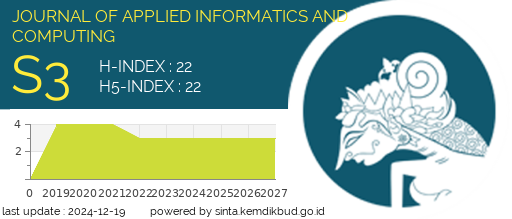RETRACTED: Pengamatan Tren Ulasan Hotel Menggunakan Pemodelan Topik Berbasis Latent Dirichlet Allocation
DOI:
https://doi.org/10.30871/jaic.v6i1.3645Abstract
Artikel dengan judul "Pengamatan Tren Ulasan Hotel Menggunakan Pemodelan Topik Berbasis Latent Dirichlet Allocation" telah dilakukan pencabutan artikel (RETRACT) dari vol. 6 no. 1 tahun 2022 Journal of Applied Informatics and Computing (JAIC), karena ditemukan duplikasi publikasi oleh penulis yang bersangkutan pada JIKO (Jurnal Informatika dan Komputer) https://ejournal.akakom.ac.id/index.php/jiko/article/view/579
Penulis meminta maaf dan meminta untuk melakukan pencabutan artikel dari Journal of Applied Informatics and Computing (JAIC). Berikut surat permohonan pencabutan artikel dari penulis disini.
Downloads
References
-
Downloads
Published
How to Cite
Issue
Section
License
Copyright (c) 2022 Suparyati Suparyati, Emma Utami, Agus Fathurahman

This work is licensed under a Creative Commons Attribution-ShareAlike 4.0 International License.
Authors who publish with this journal agree to the following terms:
- Authors retain copyright and grant the journal right of first publication with the work simultaneously licensed under a Creative Commons Attribution License (Attribution-ShareAlike 4.0 International (CC BY-SA 4.0) ) that allows others to share the work with an acknowledgement of the work's authorship and initial publication in this journal.
- Authors are able to enter into separate, additional contractual arrangements for the non-exclusive distribution of the journal's published version of the work (e.g., post it to an institutional repository or publish it in a book), with an acknowledgement of its initial publication in this journal.
- Authors are permitted and encouraged to post their work online (e.g., in institutional repositories or on their website) prior to and during the submission process, as it can lead to productive exchanges, as well as earlier and greater citation of published work (See The Effect of Open Access).











